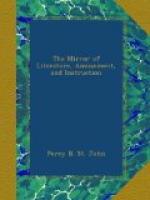Oh! no—the trumpet-voice of
war,
Shall proudly sound again,
And millions shall obey its call,
And break their chartered
chain!
Till then, my native hearth and home
I’ll joyfully resign;
Farewell! thou song-enchanted land
Of myrtle and of vine.
Deal. G.K.C.
* * * * *
THE DEATH-BEDS OF GREAT MEN.
(For the Mirror.)
If there are any remarks which deserve to be recorded for the benefit of mankind, they are those which have been expressed on a dying bed, when, unfettered by prejudice or passion, Truth shines forth in her real colours. Sir John Hawkins has recorded of Dr. Johnson, that when suffering under that disease which ended in his dissolution, he addressed his friends in the following words:—“You see the state I am in, conflicting with bodily pain and mental distraction. While you are in health and strength, labour to do good, and avoid evil, if ever you wish to escape the distress that oppresses me.”
When Lord Lyttleton was on his death-bed, his daughter, Lady Valentia, and her husband, came to see him. He gave them his solemn benediction, adding—“Be good, be virtuous, my lord; you must come to this.”
The triumphant death of Addison will be remembered with feelings of pleasure by all. Having sent for the young Earl of Warwick, he affectionately pressed his hand, saying—“See in what peace a Christian can die!”
The father of William Penn was opposed to his son’s religious principles; but finding that he acted with sincerity, was at last reconciled. When dying, he adjured him to do nothing contrary to his conscience—“So,” said he, “you will keep peace within, which will be a comfort in the day of trouble.”
Locke, the day before his death, addressed Lady Masham, who was sitting by his bedside, exhorting her to regard this world only as a state of preparation for a better. He added, that he had lived long enough, and expressed his gratitude to God for the happiness that had fallen to his lot.
Tillotson, when dying, thanked his Maker that he felt his conscience at ease, and that he had nothing further to do but to await the will of Heaven.
Sir Walter Raleigh behaved on the scaffold with the greatest composure. Having vindicated his conduct in an eloquent speech, he felt the edge of the axe, observing with a smile—“It is a sharp medicine, but a sure remedy, for all woes.” Being asked which way he would lay himself on the block, he replied—“So the heart be right, it is no matter which way the head lies.”
Latimer, when he beheld a fagot ready kindled laid at Ridley’s feet, exclaimed—“Be of good cheer, master Ridley, and play the man; we shall this day light such a candle in England, as I hope, by God’s grace, shall never be put out.”




